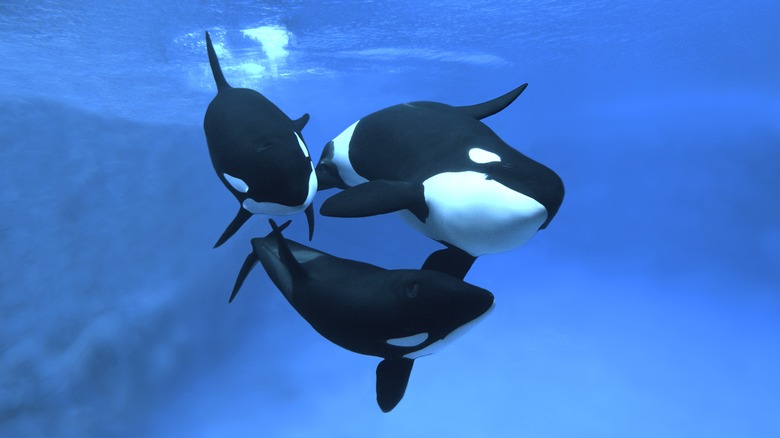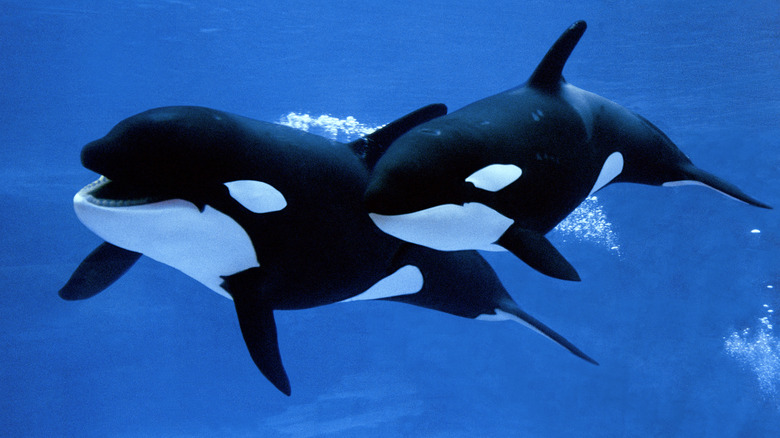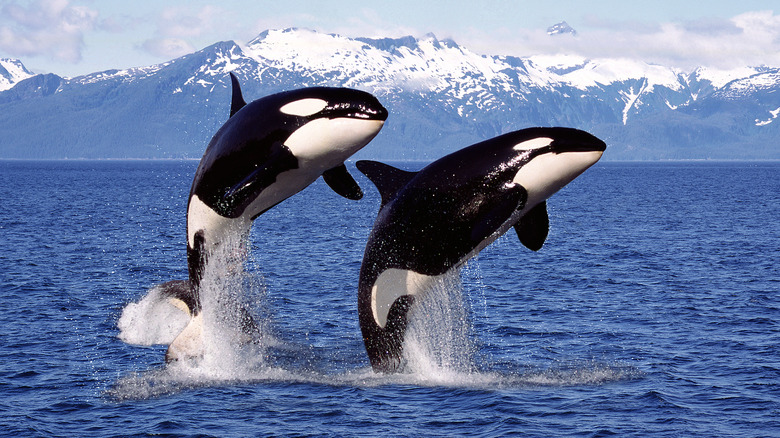Why Orca Moms Tend To Show Favoritism Towards Their Sons
Adult male orcas who live along the Pacific coast of North America are especially attached to their mothers, according to a study from the Center for Whale Research (CWR) in Harbor, Washington, published in the journal Current Biology. What that research found is that one certain species of orca, Orcinus orca, sometimes called killer whales, which don't migrate but instead live full-time off the Pacific Northwest coast of North America, give preferential treatment in one key way to their male offspring, even after they've grown. These same behaviors were not displayed toward their female orca children, the CWR study found.
What's been observed amounts to more than just parental favoritism, though. Though these grown orca mothers pay a price for doing so, there seems to be an evolutionary advantage for the orca mother to take extra care of their adult son, according to the center's findings. CWR research director, Michael Weiss (via CNN), "We've known for over a decade that adult male killer whales relied on their mothers to keep them alive, but it had never been clear whether mothers pay a cost to do so."
Orca moms in the Pacific Northwest share food with their adult sons
Orcinus orca, the non-migratory species of orca in the Pacific Northwest waters of North America, dine on abundant chinook salmon, and what CWR researchers found is that orca mothers eat only half of what they catch, allowing their sons, which tend to trail close behind them at all times, to have the remainder. That's while grown female orcas while living in the same pod, become much more independent and in charge of their own food supply. This research was done over many generations of orcas in the Pacific Northwest area, and further study was necessary to determine if these behaviors show up across other orca populations.
According to CWR research director Michael Weiss, this is the first sign of an animal species providing long-term investment in the health and well-being of their offspring. Via BBC News, Weiss added, "Our previous research has shown that sons have a higher chance of survival if their mother is around." Researchers wanted to find out if that added help came at a price, and it does. "Killer whale mothers pay a high cost in terms of their future reproduction to keep their sons alive," Weiss said.
Once a mother orca has a son, chances are that's the last time she'll reproduce
What CWR research concluded is that there's a tradeoff for orca mothers when they have male offspring. They're unlikely to have another calf of any gender (and that's not for lack of trying) and this is attributed to the fact that orca mothers don't consume enough nutrients to successfully reproduce. They share half of what they catch and eat with their grown male children. What those mother orcas gain by doing so, though, is an increased likelihood that their sons will become a dominant breeding male in the population: What she lacks in her own offspring, she'll make up for in grandchildren.
Evidence suggests the arrangement between male adult orcas and their mothers is consensual, and among some orcas populations, grandmothers play an important role in the social structure. On that note, University of Exeter professor Darren Croft, who was involved in the study, said (via BBC News), "If a mother can get their son to become that big male in the population, then he's the one that will sire [much of the next generation]." Via CNN, CWR research director Michael Weiss said, "One big take-away is further evidence for how special (and maybe unique) the mother-son bond in killer whales is ... It opens a new window ... [into] the way that the evolutionary dance between the interests of individuals and genes is constantly interacting with ecology and sociality," Weiss added.


